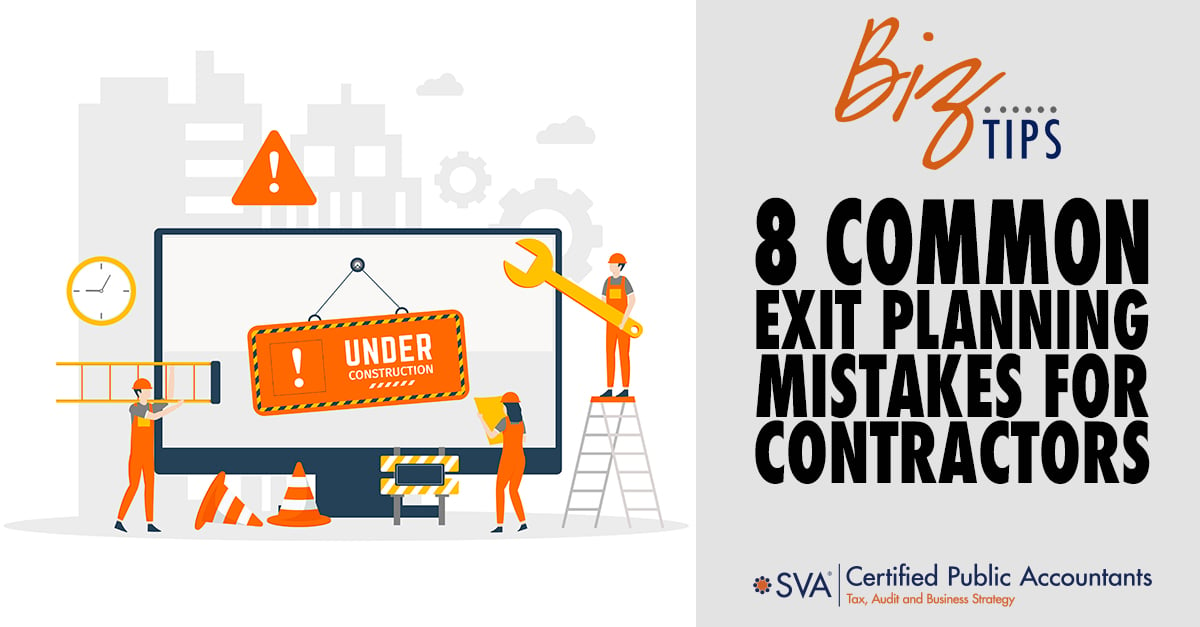How to Avoid These 8 Common Exit Planning Mistakes for Contractors
Exiting your contracting business efficiently and with minimal losses requires solid planning. No matter who you're transferring your business to, the path can have some issues if you haven't planned carefully. But good planning allows you to turn it around before it becomes a problem.
Here's how to avoid 8 common mistakes made by contractors when exiting a company.
1. Plan Early to Maximize Transferable Value
Contractors often fall into the daily grind and put off what seems like non-urgent business matters. The end comes faster than you might expect. Between planning and implementation, you'll need three to five years to exit your contracting firm, so start planning ASAP. This allows you to maximize the business's ongoing financial health and transferable value, showing the company's success is independent of the owner.
2. Conduct a Gap Analysis to Make Sure You'll Meet Post-Exit Monetary Needs
Once you've sold your business, can you live comfortably? As you prepare for exit, get a valuation to understand what you'll gain from selling the company, then weigh it against your post-exit expenses.
This gives you a solid baseline to set business goals before leaving and gives you options when you transfer. A third-party sale may take a shorter period of time so to transfer to family, bridge the gap with continued business involvement until it's done.
3. Add In-House Options to Build Company Value
Lowering costs and maximizing cash flow increase business value, but there are other options beyond increasing productivity and improving efficiency.
Analyze the cost against time savings projections, increases in revenue, and the hike you'll see in business value when you add automation or workflow automation to improve productivity. Develop a solid, realistic growth plan and formally documented processes to increase business value.
4. Find Value Drivers Outside the Box
Obtaining assets to grow your business (such as customer lists, inventory, experienced staff, or equipment from smaller businesses that are struggling) can boost your business. It allows you to expand a geographic footprint, either solely or in a partnership.
Weigh costs against capital and consider if area competition can help you assess your options. This lets you vertically integrate, while customer diversification or service work can boost your income.
5. Don't Underestimate Key Employee Value
Your key employees help maintain and increase cash flow, relationships, and daily operations. Maintaining your team and finding good help is a challenge, but key employees move business value in a positive direction, making them critical to getting the best sale price for your company.
Add incentive plans (including non-qualified deferred compensation, bonuses and stock options, bonuses, and purchases) to help keep them motivated and happy.
6. Make Sure the Sale/Transfer is "Balance-Sheet Friendly"
This means your open jobs and contracts are met or reassigned. The transaction needs to happen when it's financially feasible for both you and your company's new owner. With the many moving parts that have to be in place to make it work, your plan should protect assets and account for the ability to keep liquidity up to and through the transfer process.
Keep impacts on surety, banking, and credit at the front of your efforts because it affects who is responsible for loan covenants.
(Download Video Transcript)
7. Tax Planning is Vital to the Process
To reduce some liabilities in ownership transfer, tax planning needs to happen carefully as a continuous process. In family transfers, leveraging opportunities over time and balancing your income, capital gains, and gift and estate taxes can make a big difference.
With the tax rate increase on the horizon for high-income people, it's important to use timing to minimize your tax liability by working with a tax and finance professional.
8. Use the Best Team of Advisors
Exit planning is complicated and requires a lot of knowledge. Make sure you're working with a trusted team of advisors who can help you with a range of related issues, including your business value, improving profitability, strategic planning, asset protection, tax minimization, business continuity, and company development.
If you need help updating your exit planning for tax and financial changes, please contact SVA today.
© 2021 CPA ContentPlus

